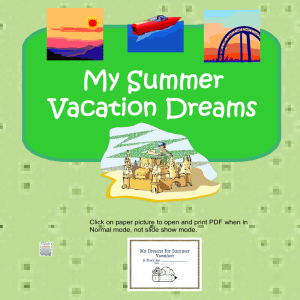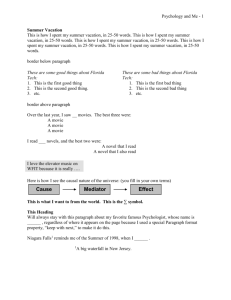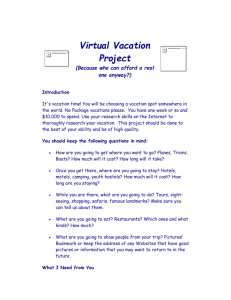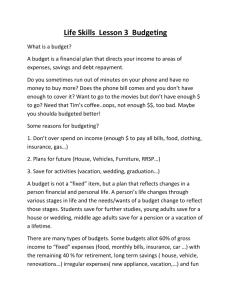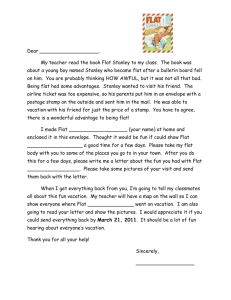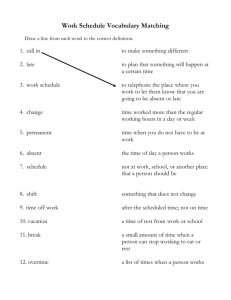What is A Virtual Vacation
advertisement
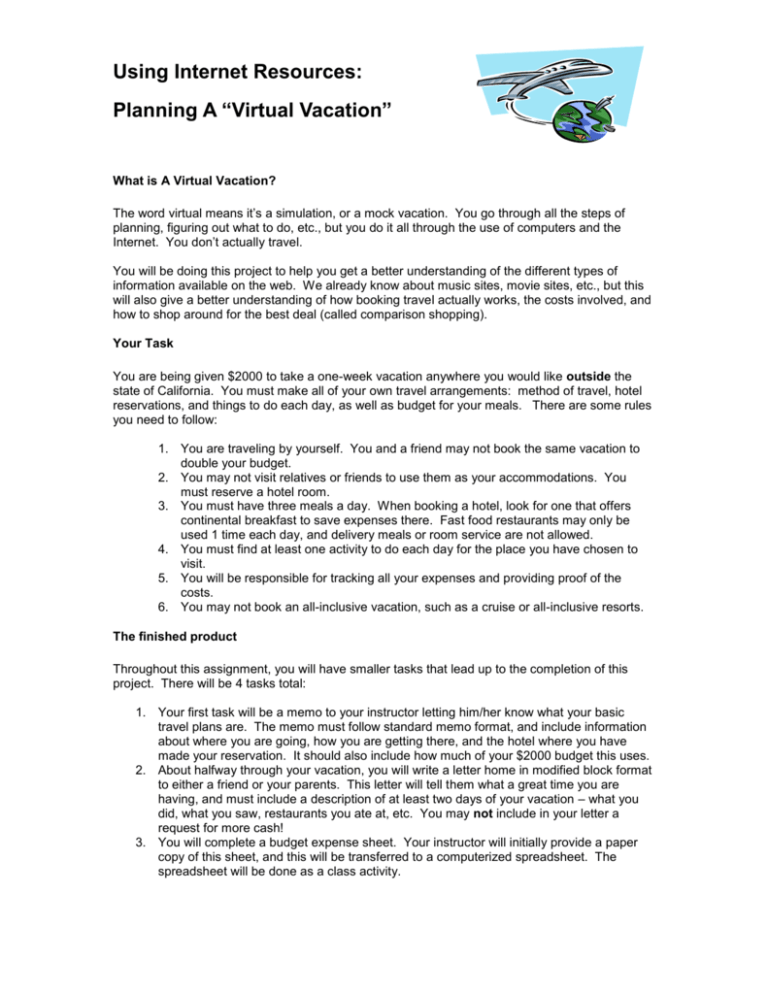
Using Internet Resources: Planning A “Virtual Vacation” What is A Virtual Vacation? The word virtual means it’s a simulation, or a mock vacation. You go through all the steps of planning, figuring out what to do, etc., but you do it all through the use of computers and the Internet. You don’t actually travel. You will be doing this project to help you get a better understanding of the different types of information available on the web. We already know about music sites, movie sites, etc., but this will also give a better understanding of how booking travel actually works, the costs involved, and how to shop around for the best deal (called comparison shopping). Your Task You are being given $2000 to take a one-week vacation anywhere you would like outside the state of California. You must make all of your own travel arrangements: method of travel, hotel reservations, and things to do each day, as well as budget for your meals. There are some rules you need to follow: 1. You are traveling by yourself. You and a friend may not book the same vacation to double your budget. 2. You may not visit relatives or friends to use them as your accommodations. You must reserve a hotel room. 3. You must have three meals a day. When booking a hotel, look for one that offers continental breakfast to save expenses there. Fast food restaurants may only be used 1 time each day, and delivery meals or room service are not allowed. 4. You must find at least one activity to do each day for the place you have chosen to visit. 5. You will be responsible for tracking all your expenses and providing proof of the costs. 6. You may not book an all-inclusive vacation, such as a cruise or all-inclusive resorts. The finished product Throughout this assignment, you will have smaller tasks that lead up to the completion of this project. There will be 4 tasks total: 1. Your first task will be a memo to your instructor letting him/her know what your basic travel plans are. The memo must follow standard memo format, and include information about where you are going, how you are getting there, and the hotel where you have made your reservation. It should also include how much of your $2000 budget this uses. 2. About halfway through your vacation, you will write a letter home in modified block format to either a friend or your parents. This letter will tell them what a great time you are having, and must include a description of at least two days of your vacation – what you did, what you saw, restaurants you ate at, etc. You may not include in your letter a request for more cash! 3. You will complete a budget expense sheet. Your instructor will initially provide a paper copy of this sheet, and this will be transferred to a computerized spreadsheet. The spreadsheet will be done as a class activity. 4. The final project: An MLA format report that gives a day-by-day breakdown of each day’s events and expenses. The first paragraph should include information about where you chose to go, how you got there, and where you stayed. The remaining paragraphs should describe each day’s activities. Your last paragraph would be a summary of how much you spent in each of your worksheet categories, with the total amount spent. FAQ’s (frequently asked questions) Can I drive to my vacation? Yes. If you do so, you must figure out the following information, and include it in your budget: distance traveled, miles per gallon to the car you are driving, how many gallons of gas you would use, and cost per gallon. If you plan on driving, use a site like mapquest.com to determine miles driven and directions for getting there. Can’t I just go camping and plan my own food expenses? No. You must plan on staying in a hotel during your vacation. Do I have to spend all the money? No, but expenses must be realistic. If you submit a report telling me that you spent $50 for food all week that is not realistic. Can the events I attend be free events? Absolutely. One of the best ways to take a budget vacation is to visit a website for that area’s chamber of commerce or visitor’s bureau to see what events are being held free of charge to the public. What expenses must I include for every day of my trip? Day 1 should include your travel (airfare, train, etc.), car rental, and hotel costs. You would also include a dinner expense for the first evening, since breakfast was eaten at home and you had airline food for lunch (word to the wise: bring your own food on the plane). If driving for your vacation, include a lunch cost. Days 2-6 would include hotel cost per evening (if not booked as a package), breakfast, lunch, and dinner, and at least one attraction-related cost. Day 7 would be breakfast and then the trip home. Other expenses to include would be souvenirs and any other extras while you are on vacation. Track these expenses carefully – they add up quickly. Can I go to Reno or Vegas and use my money for gambling? You are not allowed to go gambling in casinos; you may go to the casino’s shows as one of your events. Include ticket costs in your budget. Can’t I bring my own food to the hotel? No. If you buy food for your hotel room, it should only be snack foods and should be included on your budget sheet. Meals must be eaten at restaurants.
